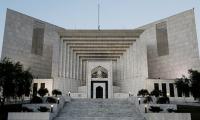The Jamaatud Dawa’s (JuD) recently launched offshoot appears to be a national entity, but its Karachi leaders will focus on the city’s politics with the hope to become an influential stakeholder.
The Milli Muslim League (MML), announced at a news conference in Islamabad on August 7, will be headed by Saifullah Khalid, a religious scholar and a long-time official of the JuD. The political party aims to make Pakistan “a real Islamic state”.
Starting its political activities in the metropolis, the MML announced organising a rally on August 14 from University Road to Quaid-e-Azam Muhammad Ali Jinnah’s mausoleum.
Taking into account the significance of Karachi, Muzammil Iqbal Hashmi, the JuD’s former president for the organisation’s metropolis chapter, has been appointed the MML’s central vice-president.
Hashmi told The News that the main objective of his party was to implement the ideology of Pakistan in accordance with the vision of the Quaid and Allama Iqbal as well as the 1973 constitution. He said Karachi was the heart of Pakistan, whose elders had rendered sacrifices for the creation of the country. “Karachi’s residents are peace-loving people, who are frustrated with politics on the basis of violence, ethnicity and sectarianism. For them the MML will be a good alternative as it believes in peace and development.”
The MML has finalised its manifesto and flag colour as well as applied for registration with the Election Commission of Pakistan. Although Khalid had announced at the news conference that his party would contest the 2018 general polls and had hinted at forming electoral alliances with like-minded ideological parties, Hashmi said that it was too early to comment on the subject.
“First we shall concentrate our energies on organising the party in the country, including Karachi. Without strengthening the party at grassroots level, it is hard to take part in the general elections.”
The Ministry of Interior has placed the JuD and its charity, the Falah-e-Insaniat Foundation (FIF), on a watch list of organisations believed to be involved in militant activities. Its head Hafiz Saeed Ahmed has been under house arrest for the past six months. The house arrest was extended for two months at the beginning of this month.
Political analysts believe that the JuD and the FIF have an organisational arrangement in the metropolis and it will help the new political party organise its structure in the city. The FIF has a network of welfare projects – schools, ambulance services and dispensaries – across the city, and has recently announced introducing private fire tenders for the people of the metropolis.
However, political analysts believe that it would be difficult for the JuD to translate its welfare activities into electoral victories. Munir Ahmed Shah, a Karachi-based analyst who monitors religious parties, told The News that the JuD’s well-organised structure and resources were second only to the Jamaat-e-Islami. “Organising the party in the metropolis will not be a difficult task for the MML. The actual challenge is to get votes.”
The JuD is a religious group that follows the Ahle Hadith school of thought, but the group never showed it. It also traditionally kept its distance from electoral politics.
Markazi Jamiat Ahle Hadith is the main religious group of the Ahle Hadith school of thought that takes part in electoral politics.
The group’s chief Sajid Mir and general secretary Hafiz Abdul Kareem were recently elected senator and MNA respectively on the Pakistan Muslim League-Nawaz ticket after forging an electoral alliance.
The group was also part of the Muttahida Majlis-e-Amal, an electoral alliance of six religious parties representing different schools of thought or sects.
Religious parties in Karachi manage to garner votes on the basis of sect or school of thought. However, according to analysts, the MML’s case is different. “The number of followers of Ahle Hadith is small, if it is compared with Deobandis, Barelvis and Shias,” said Shah.
Law enforcement agencies have also been observing the JuD’s transformation. A senior official told The News that a number of religious outfits that believed in violence were now transforming themselves into national political parties.
“The JuD’s case is not the first one. The banned Ahle Sunnat Wal Jamaat is in the process of transformation from a militant group to a mainstream electoral party by distancing itself from anti-Shia rhetoric of the past.”
However, added the official, the JuD did not involve itself in any anti-state activity within the country. “In Karachi we did not see the JuD’s involvement in any sort of militancy or violence. Their militant activities are limited only to Indian-administered Kashmir.”
Pharmacists arrange medicines at a pharmacy shop. — AFP/File The Karachi administration has launched a campaign to...
In this still, Karachi Mayor Barrister Murtaza Wahab addresses an event on April 25, 2024. — Facebook/Barrister...
In this still, Sindh Inspector General of Police Ghulam Nabi Memon chairs a meeting at the Central Police Office on...
Representational image shows police tape. — AFP/FileAn elderly man who ran a general store was shot and killed in...
A handcuffed suspect stands behind the bars with a policeman standing outside the jail in this undated image. —...
In this still, Sindh Chief Minister Syed Murad Ali Shah meets federal energy minister Owais Ahmad Khan Laghari in...






